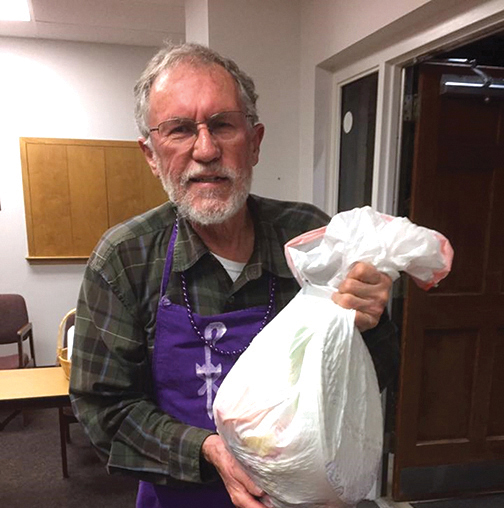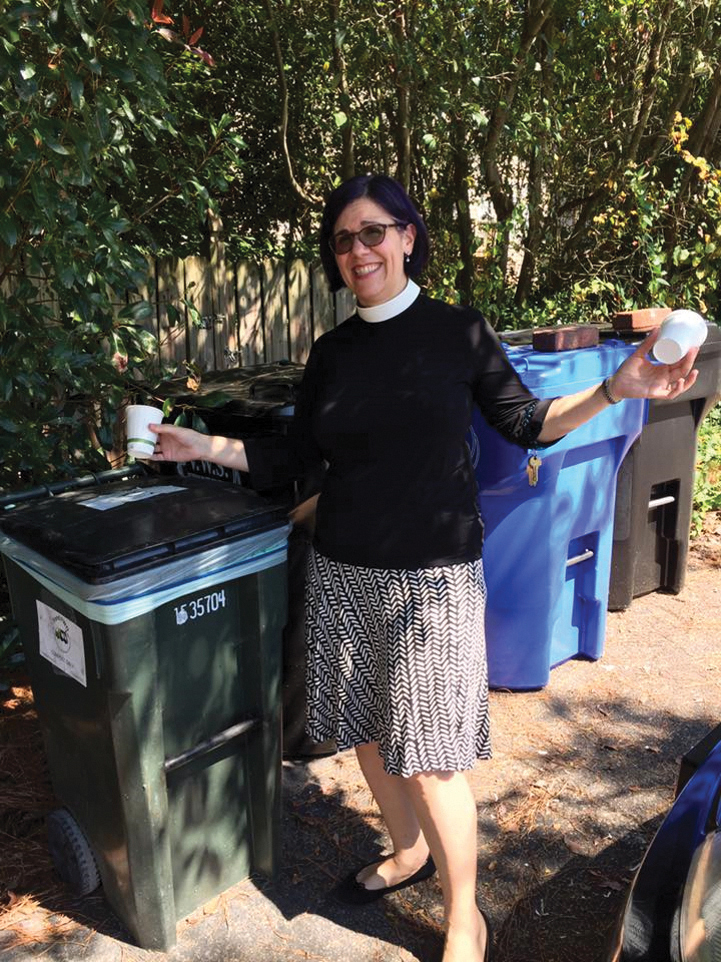Disciple: Zero Waste Church

By Christine McTaggart
When it comes to understanding the enormity of the threat posed by climate change and the need to mitigate its effects, it can be quickly overwhelming when one contemplates answering the call to help. Sure, we can all recycle and implement water saving measures, but does it really have an impact? Does it really make a difference?
The answer is yes. No one person can do it alone, but it’s the individual efforts that come together to create a lasting collective impact. Examples of this truth abound, and one such example is right here in the Diocese of North Carolina.
THE SEEDS OF ZERO WASTE
Zero Waste Church is a program embodied at Nativity, Raleigh. It began as a question, took root following an experiment and, over the last several years, has grown to be a key resource for churches and individuals seeking ways to reduce their carbon footprints and be better stewards of the environment.
The seeds were planted in 2016, when Nativity member Carl Sigel approached the Rev. Stephanie Allen, rector at Nativity, to share a project he’d learned about that was taking place in San Francisco. The project revolved around compost and its effect on soil. Climate scientists were experimenting with the creation of compost through avenues as simple as kitchen scrap collection to citywide compost bins. So much compost was generated, the next logical question became what to do with it.
Another group of climate scientists provided the answer when they requested some of the generated compost to spread on a select one-acre parcel of rangeland. They were curious what impact the compost would have on the soil, and the results were astounding. In tracking the health of the soil and the plants that grew in it, they determined that the soil treated with compost was absorbing more than a ton of additional carbon than its nearby, untreated counterpart. Even after several years, the absorption rate held steady, and the grass and plants growing on that acre were greener, lusher and overall healthier than those growing on surrounding land.
Sigel brought the exciting results to Allen and Dargan Gilmore, another member of Nativity and a founding member of the zero waste movement in North Carolina. The conversation was immediately enthusiastic.
“I remember Dargan saying, ‘This is a gift from God,’” said Allen. “It was a way forward and a combination of understanding what composting and food waste and waste reduction can do in mitigating climate change and being very intentional about our own actions.”
They asked a very simple question: What if we tried to be a Zero Waste Church? What would that look like?
ZERO WASTE PANCAKES

When those questions were asked, Lent was approaching, as was the church’s annual Shrove Tuesday pancake supper. The church decided to experiment with how the supper was offered, purchasing only compostable materials and asking anyone bringing contributions to ensure they used reusable containers. The careful questions and intentional actions yielded an incredible result: More than 150 people attended the dinner, and less than a single small bag of trash was generated.
“People were really blown away,” said Allen. “It was like, you mean this is really possible?”
“No one wants to harm the planet,” she continued. “We do want to care for creation, but we just don’t know what to do, and at the time, no one was really presenting us with any solutions. So we thought, what if we, as a church, started working on some simple solutions that we can do as an institution and that people can put into practice at home?”
With that, a Zero Waste Church way of life was born.
[Image: Carl Sigel holds the one bag of trash produced during the fateful Shrove Tuesday pancake supper that started Nativity’s zero waste journey.]
SHARING THE GOOD NEWS

“We knew we weren’t going to do it perfectly,” said Allen. “That doesn’t exist. But we understood it as a gift of grace that God is really showing us the way forward in the climate crisis, and we were going to do our best. A lot of this is rooted in an incarnational understanding of our faith and who we are as God’s people.”
As Nativity took each step in their journey, they shared it with others. A website was created; on it, visitors found resources, blog posts, programs and more. With assistance from a grant from The Episcopal Church, they created a series of conferences called Waste Not to talk about the benefits of composting and regenerative agriculture, how it could be brought to North Carolina, and the role churches could play in making it happen.
Detailed plans for churches and individuals to follow were shared, including programs such as A Year of Taking Action, where the calendar year is broken down into digestible steps, with a theme for each month and weekly suggestions to implement new approaches. Details on starting composting programs, community gardens, and bird- and pollinator-friendly gardens, and, of course, guidance on becoming a Zero Waste Church, were provided.
[Image: The Rev. Stephanie Allen throws away Nativity’s last styrofoam cup.]
For Nativity, all of it took them deeper on a journey on which they had embarked years before. Care for creation is one of the foundations of Nativity’s church life, but their efforts toward being a Zero Waste Church made every conversation a bit more considered and every decision a bit more intentional.
“I think those things that were already cooked into who we are as a congregation somewhat set us up to just take it to the next step,” said Allen. “It was a natural next step. We started asking how do we add this into the lens of how we make our decisions. For example, when we got a quote for a new HVAC system, we didn’t simply go with the cheapest option, we asked what the environmental impact was with each option.
“I think it’s about moving out of a dualism mindset and into a both/and way of thinking. Creation Care is not a separate program. This is a way of life. It’s a way of being who we are as a church.”
ONE STEP AT A TIME
When talking about implementing that new way of thinking or way of life, it’s critical to take it one step at a time. Start with what your congregation is already good at and what is life-affirming in your church life to find your direction. Be authentic to who you are; if your church is in an urban area, composting may not be where you start. If your congregation loves to eat, perhaps reducing food waste is the path for you. Take steps that feel comfortable for the congregation as a whole, and look at how those steps might be implemented by parishioners at home.
Remember, too, you don’t have to do it alone. Involve others in the conversation. Find collaborations and partnerships to share the workload or resources.
Because when it comes to caring for creation, it’s not an undertaking that anyone can do alone. It needs all of us, from individuals to corporations and governments. The wonderful thing about it is that it’s not a political or partisan issue. It’s about caring for the planet we call home and loving our neighbor.
“I think people’s inclination is that they want to do what’s right for their world,” said Allen. “They want to love their neighbor, and they understand that their personal decisions have an impact on their neighbor down the street, or in another part of Raleigh or another state or another part of the world. This is just a way of living out our values as Christians and followers of Jesus.”
ZeroWasteChurch.org
- Carbon farming
- Composting
- Gardens
- Renewable energy
- Food waste reduction
- Resources for leaders
If you’re still not sure where to start, the website offers “20 Ways to Start Being a Zero Waste Church!”
Christine McTaggart is the communications director for the Diocese of North Carolina.
Tags: North Carolina Disciple
